Hunting guide Emily Perreira is settling in to her new life in Oregon as a nursing student. She and I chatted about her experience growing up in the big game outfitting world in Hawaii, conservation and how she plans to balance college and guiding.
She Guides is sponsored by Remington Arms
I was brought up in the hunting industry.
I was born and raised in Maui, Hawaii. My parents own Maui Hunting Safari and Taxidermy Shop. From a young age, I can remember being in the taxidermy shop and seeing all the amazing trophies coming in. In Hawaii, you have to be 10-years old to hunt, but I would go out with my dad and grandfather – with my little rubber boots on – and follow along with them. I went on my first hunt when I was 5 years old in Texas and shot a feral goat. I remember being so excited and that feeling never went away.
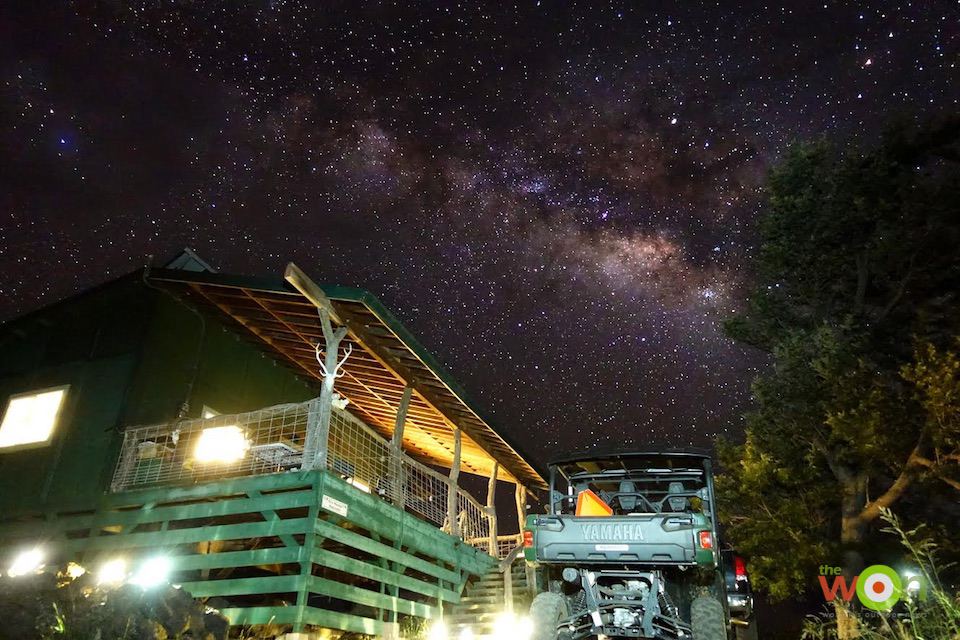
A starry sky at Maui Hunting Safari.
When I was younger I called myself a “junior guide.”
My sister and I would help my dad in the field scouting. It’s not uncommon to see 400 to 600 goats in a day. We would help debone and process the meat, helping at camp cleaning up. I learned the basics of hunting camp and grew from there. I think just from watching him work and seeing the excitement of the hunters we took I just fell in love with it. I remember the first youth hunt that I got to be a part of guiding and seeing this young girl harvest her first animal ever. Her excitement made me remember my first hunt and that really got me hooked for guiding. I can think of a lot of times when a hunter and I have worked really hard for days and when it all comes together you see their joy. It’s just as exciting to see them harvest their trophy as it would be if I did.

I come from a long line of generations of pig hunters here in Hawaii.
My mom didn’t even know hunting existed when she was growing up until she met my dad. She was never an anti-hunter, she just didn’t know anything about hunting. We do things a little different than the mainland. We take the pigs with a knife and we hunt them with dogs. We call it taking it “Hawaiian style.” It’s a tradition that’s been passed down for many years and that’s something that I would like to pass on to my kids someday. I grew up eating wild game, so I think it’s really good. Hunting isn’t just about harvesting an animal, it’s a lifestyle. I’ve created some great friendships meeting people in hunting camps. Being able to provide meat for your family, friends, and community I think is such a big part of hunting that people don’t understand.
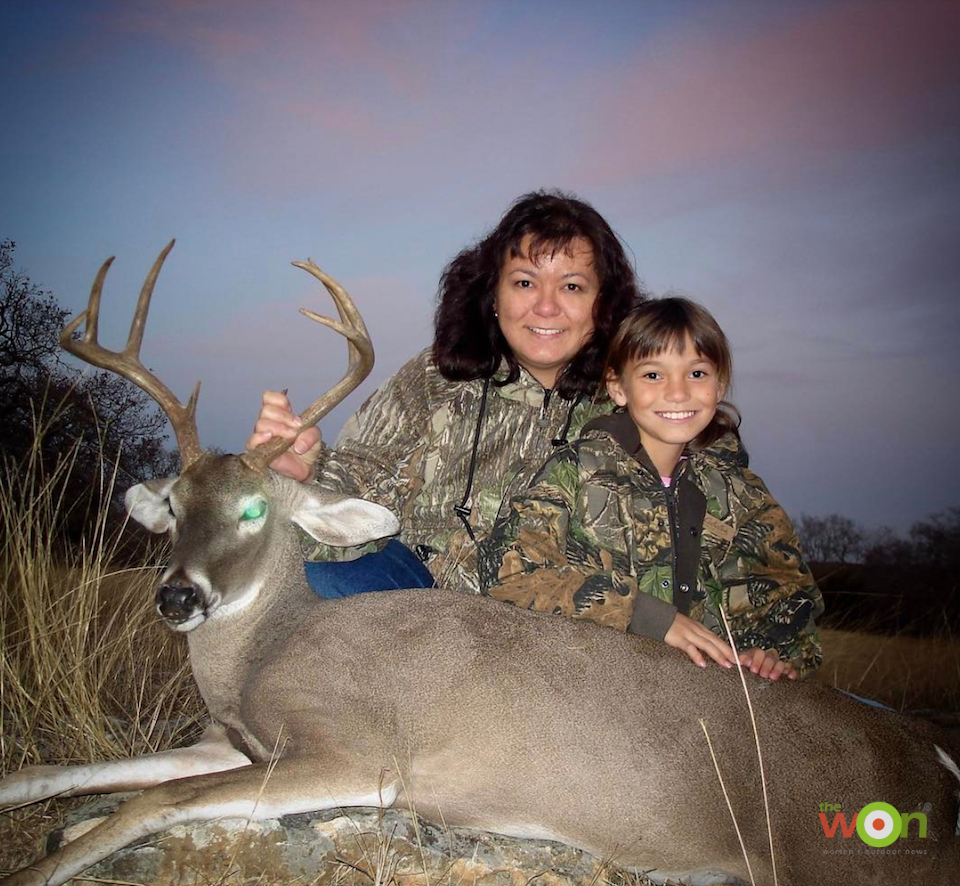
Emily Hunting with her mother.
I just started nursing school this fall in Oregon.
It’s going to take some balancing to continue guiding while I’m in college. One thing that really works out is that our busiest time is our axis deer season and that’s during the summer. So, I’ll be able to go back home and still guide for that. Pretty much during every school break, I’m trying to squeeze a hunt in somewhere! Where I am now in Portland, there are not very many hunters or people who “get” hunting. One of my goals when I’m posting to social media is just to try and put hunting in a positive light and to educate people on all the great things that hunters do like conservation. I hope I’ve changed some minds; I think I have. Just this morning my parents sent me a huge cooler of venison. I’m going to cook some for all my housemates who don’t hunt; they’re excited to try it! It should be fun.
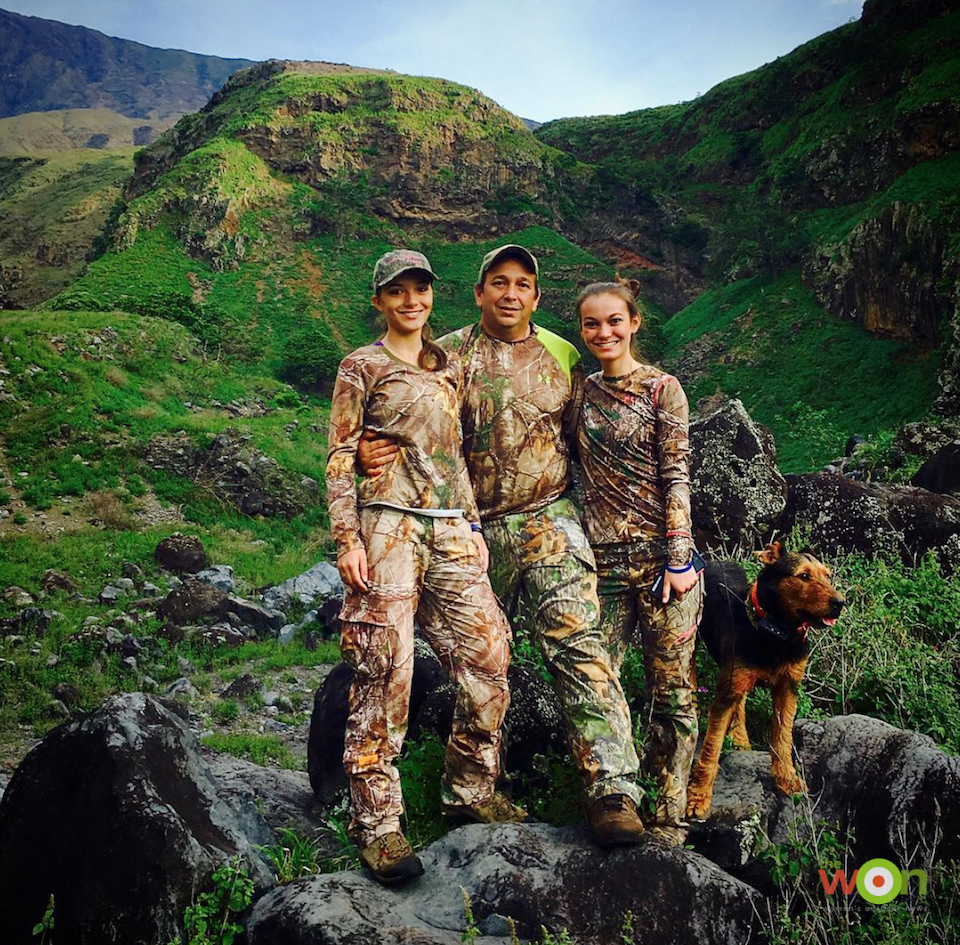
Emily hunting with her sister and father.
I’m opposite-eye dominant. But, I didn’t always know that!
I am right handed but shoot left handed since my left eye is dominant. The only way I even figured that out was I went bird hunting for the first time and I decided to see a shooting instructor because I couldn’t hit any birds! I remember the first day I went through 2 boxes of shells and could not hit a bird at all. I went to the instructor and he was the one that figured it out. So, I ended up switching. Anyone else who is in the same situation, I’m here to tell you it is never too late to change! It might take a little time to get used to, it but it is worth it in the end.
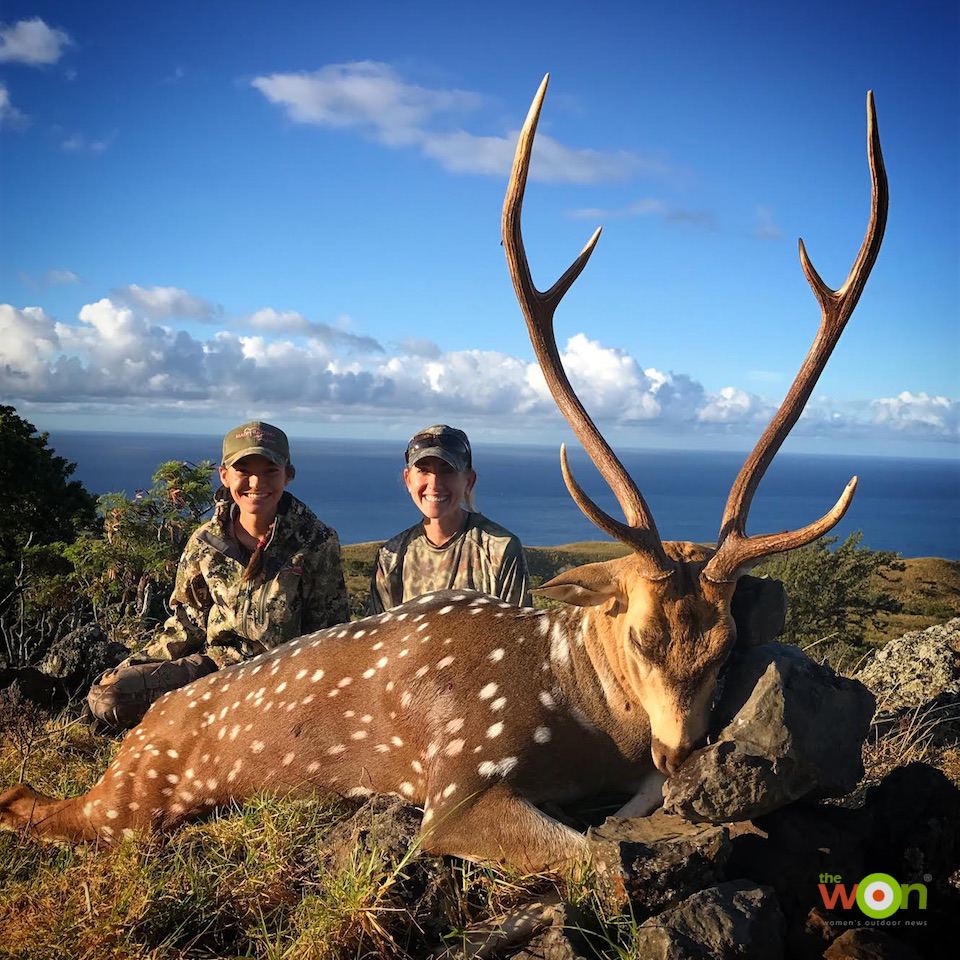
Emily with a client.
Sometimes clients are surprised to have me as a guide.
I just turned 20 and I think that my age surprises them, and also that I’m a girl. It’s just not that typical. But once we start talking and they realize my knowledge of the game and the hunting area, it gives them confidence in me. If I were to give advice to another woman who wants to get into the industry, I would say that this is still a male-dominated industry, but don’t be intimidated by that! Just have confidence and don’t shy away from it. My dad will tell you that some of the best hunters he’s taken out are females. That is because they have patience. That is also a crucial skill to have as a guide. Don’t be afraid to ask questions and learn. I think it’s a fantastic career for a woman to have.
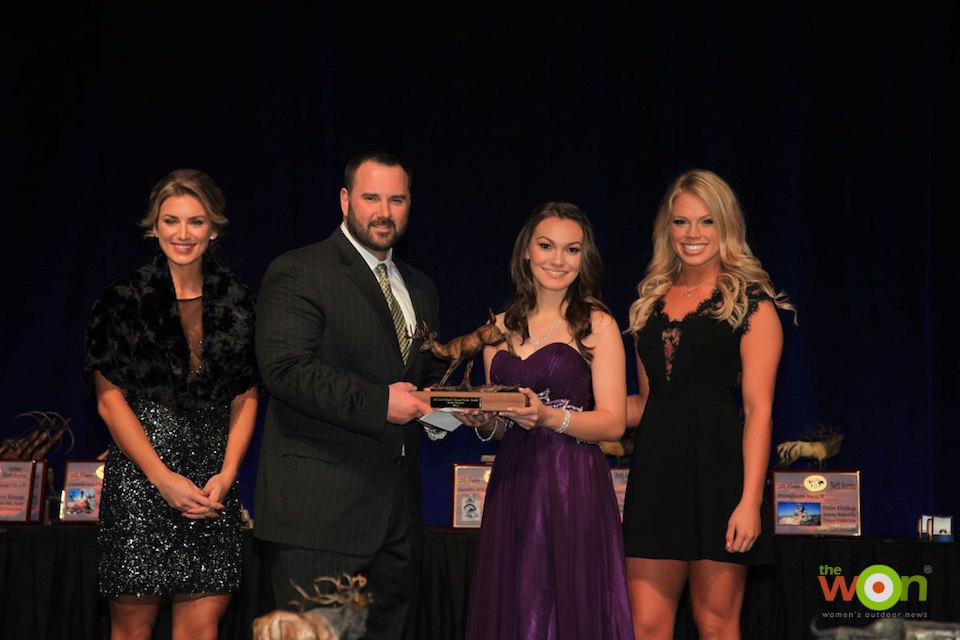
Emily accepting her SCI award. (SCI photo)
My family is a proud supporter of SCI.
We attend the [Safari Club International] convention every year and we have had a number of lifetime members come to hunt with us. A few of them had told me that I should apply for the “Young Hunter of the Year” award. When I was 17, I applied and wasn’t selected that year. I wasn’t sure if I was going to apply the next year, but I received a letter in the mail that I was nominated again. Luckily, in 2016 I was blessed to win the award. It was definitely a life-changing experience for me. I was able to meet some amazing hunters and went onstage to give a speech. Eva Shockey and Kendall Jones presented my award to me. They are huge influencers in this industry, especially as advocates for female hunters.
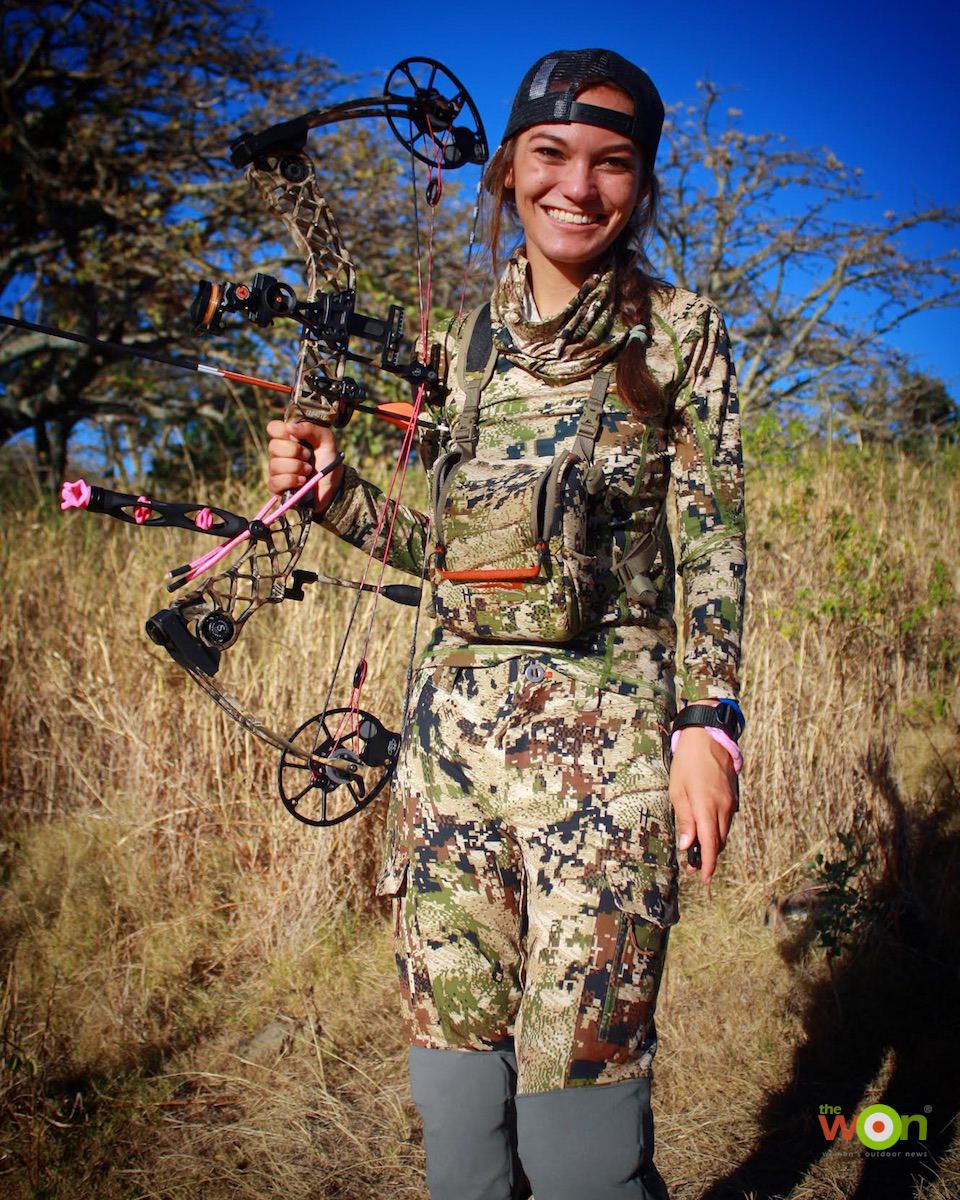
Hawaii is a challenging place to hunt. You’re up against the elements, loose rocks and heat.
In order to make an ethical shot you want to make sure you practice shooting and are in proper physical condition. For [hunting] axis deer and goats, people find it surprising when we tell them only to make shoulder shots. Coming from shooting other big game animals, they are used to lung and heart shots. Our deer and goats are very tough and don’t bleed that much, so you would have to track them for a long time. We recommend taking that shoulder shot and breaking the shoulder, and then expecting to take a follow up shot. In Maui, our hunting season is year-round. The summer months are a great time for goats because it’s dry. For axis deer, we also recommend to come in the summer since that’s when they are in hard horn. They drop their antlers in mid-October and they’re in velvet until mid-March. We recommend pig hunting in the winter months; there’s a lot more feed and it’s a little bit easier for the dogs when it’s wet.

Our client firearm is a Remington 700, chambered in .308. We recommend it because it’s a big caliber and it’s versatile. It fits a lot of hunters very well. It’s a heavier gun, so the felt recoil is a lot less.
@emily_perreira
Courtney Nicolson is an outdoor writer, hunter, and angler based in Denver, Colo. She is an active member of numerous conservation groups and is passionate about empowering women in the outdoors. Courtney is the senior producer/editor for Outdoor Sportsman Group Networks. View all posts by Courtney Nicolson